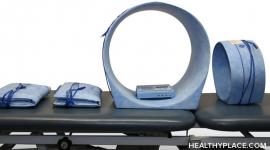Alternative Treatments: Get Informed

When it comes to alternative treatments, alternative remedies, it's like the wild west out there. Here's what you need to know.
Are You Considering Using Complementary and Alternative Medicine (CAM)?
Contents
Introduction
Decisions about your health care are important--including decisions about whether to use complementary and alternative medicine (CAM). The National Center for Complementary and Alternative Medicine (NCCAM) has developed this fact sheet to assist you in your decision-making about CAM. It includes frequently asked questions, issues to consider, and a list of sources for further information.
Key Points
-
Take charge of your health by being an informed consumer. Find out what scientific studies have been done on the safety and effectiveness of the CAM treatment in which you are interested.
-
Decisions about medical care and treatment should be made in consultation with a health care provider and based on the condition and needs of each person. Discuss information on CAM with your health care provider before making any decisions about treatment or care.
-
If you use any CAM therapy, inform your primary health care provider. This is for your safety and so your health care provider can develop a comprehensive treatment plan.
-
If you use a CAM therapy provided by a practitioner, such as acupuncture, choose the practitioner with care. Check with your insurer to see if the services will be covered. (To learn more about selecting a CAM practitioner, see our fact sheet, "Selecting a Complementary and Alternative Medicine Practitioner.") Top
Questions and Answers
- What is complementary and alternative medicine?
- How can I get reliable information about a CAM therapy?
- Are CAM therapies safe?
- How can I determine whether statements made about the effectiveness of a CAM therapy are true?
- Are there any risks to using CAM treatments?
- Are CAM therapies tested to see if they work?
- I am interested in a CAM therapy that involves treatment from a practitioner. How do I go about selecting a practitioner?
- Can I receive treatment or a referral to a practitioner from NCCAM?
- Can I participate in CAM research through a clinical trial?
Questions to ask when evaluating Web site information:
Who runs the site? Is it Government, a university, or a reputable medical or health-related association? Is it sponsored by a manufacturer of products, drugs, etc.? It should be easy to identify the sponsor.
What is the purpose of the site? Is it to educate the public or to sell a product? The purpose should be clearly stated.
What is the basis of the information? Is it based on scientific evidence with clear references? Advice and opinions should be clearly set apart from the science. For More Information
1. What is complementary and alternative medicine?
Complementary and alternative medicine (CAM) is a group of diverse medical and health care systems, practices, and products that are not presently considered to be a part of conventional medicine.1 People use CAM therapies in a variety of ways. CAM therapies used alone are often referred to as "alternative." When used in addition to conventional medicine, they are often referred to as "complementary." The list of what is considered to be CAM changes continually, as those therapies that are proven to be safe and effective become adopted into conventional health care and as new approaches to health care emerge. For more about these terms, see the NCCAM fact sheet "What Is Complementary and Alternative Medicine?"
2. How can I get reliable information about a CAM therapy?
It is important to learn what scientific studies have discovered about the therapy in which you are interested. It is not a good idea to use a CAM therapy simply because of something you have seen in an advertisement or on a Web site or because someone has told you that it worked for them. (See sidebar for some tips on evaluating the information you see on a Web site.) Understanding a treatment's risks, potential benefits, and scientific evidence is critical to your health and safety. Scientific research on many CAM therapies is relatively new, so this kind of information may not be available for every therapy. However, many studies on CAM treatments are under way, including those that NCCAM supports, and our knowledge and understanding of CAM is increasing all the time. Here are some ways to find scientifically based information:
Talk to your health care practitioner(s). Tell them about the therapy you are considering and ask any questions you may have about safety, effectiveness, or interactions with medications (prescription or non-prescription). They may know about the therapy and be able to advise you on its safety and use. If your practitioner cannot answer your questions, he may be able to refer you to someone who can. Your practitioner may also be able to help you interpret the results of scientific articles you have found.
-
Use the Internet to search medical libraries and databases for information. One database called CAM on PubMed (see "For More Information"), developed by NCCAM and the National Library of Medicine, gives citations or abstracts (brief summaries) of the results of scientific studies on CAM. In some cases, it provides links to publishers' Web sites where you may be able to view or obtain the full articles. The articles cited in CAM on PubMed are peer-reviewed--that is, other scientists in the same field have reviewed the article, the data, and the conclusions, and judged them to be accurate and important to the field. Another database, International Bibliographic Information on Dietary Supplements, is useful for searching the scientific literature on dietary supplements (see "For More Information"). If you do not have access to the Internet, contact the NCCAM Clearinghouse (see "For More Information"). The staff is available to discuss your needs with you and assist you in searching the peer-reviewed medical and scientific literature.
-
Visit your local library or a medical library to see if there are books or publications that contain scientific articles discussing CAM in general or the treatment in which you are interested. Thousands of articles on health issues and CAM are published in books and scientific journals every year. A reference librarian can help you search for those on the therapy that interests you.
3. Are CAM therapies safe?
Each treatment needs to be considered on its own. However, here are some issues to think about when considering a CAM therapy.
-
Many consumers believe that "natural" means the same thing as "safe." This is not necessarily true. For example, think of mushrooms that grow in the wild: some are safe to eat, while others are poisonous.
-
Individuals respond differently to treatments. How a person might respond to a CAM treatment depends on many things, including the person's state of health, how the treatment is used, or the person's belief in the treatment.
-
For a CAM product that is sold over the counter (without a prescription), such as a dietary supplement,2 safety can also depend on a number of things:
- The components or ingredients that make up the product
- Where the components or ingredients come from
- The quality of the manufacturing process (for example, how well the manufacturer is able to avoid contamination
The manufacturer of a dietary supplement is responsible for ensuring the safety and effectiveness of the product before it is sold. The U.S. Food and Drug Administration (FDA) cannot require testing of dietary supplements prior to marketing. However, while manufacturers are prohibited from selling dangerous products, the FDA can remove a product from the marketplace if the product is dangerous to the health of Americans. Furthermore, if in the labeling or marketing of a dietary supplement a claim is made that the product can diagnose, treat, cure, or prevent disease, such as "cures cancer," the product is said to be an unapproved new drug and is, therefore, being sold illegally. Such claims must have scientific proof.
- For CAM therapies that are administered by a practitioner, the training, skill, and experience of the practitioner affect safety. However, in spite of careful and skilled practice, all treatments--whether CAM or conventional--can have risks.
4. How can I determine whether statements made about the effectiveness of a CAM therapy are true?
Statements that manufacturers and providers of CAM therapies may make about the effectiveness of a therapy and its other benefits can sound reasonable and promising. However, they may or may not be backed up by scientific evidence. Before you begin using a CAM treatment, it is a good idea to ask the following questions:
-
Is there scientific evidence (not just personal stories) to back up the statements? Ask the manufacturer or the practitioner for scientific articles or the results of studies. They should be willing to share this information, if it exists.
-
Does the Federal Government have anything to report about the therapy?
-
Visit the FDA online at www.fda.gov to see if there is any information available about the product or practice. Information specifically about dietary supplements can be found on FDA's Center for Food Safety and Applied Nutrition Web site at www.cfsan.fda.gov. Or visit the FDA's Web page on recalls and safety alerts at www.fda.gov/opacom/7alerts.html.
-
Check with the Federal Trade Commission (FTC) at www.ftc.gov to see if there are any fraudulent claims or consumer alerts regarding the therapy. Visit the Diet, Health, and Fitness Consumer Information Web site at http://www.ftc.gov/bcp/menus/consumer/health/weight.shtm
-
Visit the NCCAM Web site, www.nccam.nih.gov, or call the NCCAM Clearinghouse to see if NCCAM has any information or scientific findings to report about the therapy.
-
-
How does the provider or manufacturer describe the treatment? The FDA advises that certain types of language may sound impressive but actually disguise a lack of science. Be wary of terminology such as "innovation," "quick cure," "miracle cure," "exclusive product," "new discovery," or "magical discovery." Watch out for claims of a "secret formula." If a therapy were a cure for a disease, it would be widely reported and prescribed or recommended. Legitimate scientists want to share their knowledge so that their peers can review their data. Be suspicious of phrases like "suppressed by Government" or claims that the medical profession or research scientists have conspired to prevent a therapy from reaching the public. Finally, be wary of claims that something cures a wide range of unrelated diseases (for example, cancer, diabetes, and AIDS). No product can treat every disease and condition.
5. Are there any risks to using CAM treatments?
Yes, there can be risks, as with any medical therapy. These risks depend upon the specific CAM treatment. The following are general suggestions to help you learn about or minimize the risks.
-
Discuss with your health care practitioner any CAM treatment that you are considering or are using; it is important for your safety and for a comprehensive treatment plan. For example, herbal or botanical products and other dietary supplements may interact with medications (prescription or non-prescription). They may also have negative, even dangerous, effects on their own. Research has shown that the herb St. John's wort, which is used by some people to treat depression, may cause certain drugs to become less effective. And kava, an herb that has been used for insomnia, stress, and anxiety, has been linked to liver damage.
-
If you have more than one health care provider, let all of them know about CAM and conventional therapies you are using. This will help each provider make sure that all aspects of your health care work together.
-
Take charge of your health by being an informed consumer. Find out what the scientific evidence is about any treatment's safety and whether it works.
-
If you decide to use a CAM treatment that would be given by a practitioner, choose the practitioner carefully to help minimize any possible risks.
6. Are CAM therapies tested to see if they work?
While some scientific evidence exists regarding the effectiveness of some CAM therapies, for most there are key questions that are yet to be answered through well-designed scientific studies--questions such as whether they are safe, how they work, and whether they work for the diseases or medical conditions for which they are used.
NCCAM is the Federal Government's lead agency on scientific research of CAM. NCCAM supports research on CAM therapies to determine if they work, how they work, whether they are effective, and who might benefit most from the use of specific therapies.
7. I am interested in a CAM therapy that involves treatment from a practitioner. How do I go about selecting a practitioner?
Here are a few things to consider when selecting a practitioner. If you need more information, see our fact sheet "Selecting a Complementary and Alternative Medicine Practitioner."
-
Ask your physician, other health professionals, or someone you believe to be knowledgeable regarding CAM whether they have recommendations.
-
Contact a nearby hospital or a medical school and ask if they maintain a list of area CAM practitioners or could make a recommendation. Some regional medical centers may have a CAM center or CAM practitioners on staff.
-
Contact a professional organization for the type of practitioner you are seeking. Often, professional organizations have standards of practice, provide referrals to practitioners, have publications explaining the therapy (or therapies) that their members provide, and may offer information on the type of training needed and whether practitioners of a therapy must be licensed or certified in your state. Professional organizations can be located by searching the Internet or directories in libraries (ask the librarian). One directory is the Directory of Information Resources Online (DIRLINE) compiled by the National Library of Medicine (http://dirline.nlm.nih.gov/). It contains locations and descriptive information about a variety of health organizations, including CAM associations and organizations.
-
Many states have regulatory agencies or licensing boards for certain types of practitioners. They may be able to provide you with information regarding practitioners in your area. Your state, county, or city health department may be able to refer you to such agencies or boards. Licensing, accreditation, and regulatory laws for CAM practices are becoming more common to help ensure that practitioners are competent and provide quality services.
8. Can I receive treatment or a referral to a practitioner from NCCAM?
NCCAM is the Federal Government's lead agency dedicated to supporting research on CAM therapies. NCCAM does not provide CAM therapies or referrals to practitioners.
9. Can I participate in CAM research through a clinical trial?
NCCAM supports clinical trials (research studies in people) of CAM therapies. Clinical trials of CAM are taking place in many locations worldwide, and study participants are needed. To find out more about clinical trials in CAM, see the NCCAM fact sheet "About Clinical Trials and Complementary and Alternative Medicine." To find trials that are recruiting participants, go to the Web site www.nccam.nih.gov/clinicaltrials. You can search this site by the type of therapy being studied or by disease or condition.
For More Information
NCCAM Clearinghouse
Toll-free in the U.S.: 1-888-644-6226
International: 301-519-3153
TTY (for deaf and hard-of-hearing callers): 1-866-464-3615
E-mail: info@nccam.nih.gov
Web site: www.nccam.nih.gov
Address: NCCAM Clearinghouse,
P.O. Box 7923, Gaithersburg, MD 20898-7923
Fax: 1-866-464-3616
Fax-on-Demand service: 1-888-644-6226
The NCCAM Clearinghouse provides information about CAM and about NCCAM.
NIH Office of Dietary Supplements (ODS)
Web site: http://ods.od.nih.gov
Telephone: 301-435-2920
E-mail: ods@nih.gov
Fax: 301-480-1845
Address: 6100 Executive Blvd., Bethesda, MD 20892-7517
The ODS, whose mission is to explore the potential role of dietary supplements to improve health care, promotes the scientific study of dietary supplements through conducting and coordinating scientific research and compiling and disseminating research results. ODS provides all its public information through its Web site. One of its services is the International Bibliographic Information on Dietary Supplements (IBIDS) database, at http://ods.od.nih.gov/databases/ibids.html.
CAM on PubMed
Web site: www.nlm.nih.gov/nccam/camonpubmed.html
CAM on PubMed, a database accessible via the Internet, was developed jointly by NCCAM and the National Library of Medicine (NLM). It contains bibliographic citations to articles in scientifically based, peer-reviewed journals on CAM. These citations are a subset of the NLM's PubMed system that contains over 12 million journal citations from the MEDLINE database and additional life science journals important to health researchers, practitioners, and consumers. CAM on PubMed displays links to publisher Web sites; some sites offer the full text of articles.
ClinicalTrials.gov
Web site: http://clinicaltrials.gov
ClinicalTrials.gov provides patients, family members, health care professionals, and members of the public access to information on clinical trials for a wide range of diseases and conditions. The National Institutes of Health (NIH), through its National Library of Medicine, has developed this site in collaboration with all NIH Institutes and the U.S. Food and Drug Administration. The site currently contains more than 6,200 clinical studies sponsored by NIH, other Federal agencies, and the pharmaceutical industry in over 69,000 locations worldwide.
U.S. Food and Drug Administration (FDA)
Web site: www.fda.gov
Toll-free: 1-888-INFO-FDA (1-888-463-6332)
Address: 5600 Fishers Lane, Rockville, MD 20857-0001
FDA's mission is to promote and protect the public health by helping safe and effective products reach the market in a timely way, and monitoring products for continued safety after they are in use. To report serious adverse events or illnesses related to FDA-regulated products, such as drugs, medical devices, medical foods, and dietary supplements, contact MedWatch:
Web site: www.fda.gov/medwatch/report/consumer/consumer.htm Toll-free: 1-800-FDA-1088 Fax: 1-800-FDA-0178
To report a general complaint or concern about food products, including dietary supplements, you may contact the consumer complaint coordinator at the FDA District Office nearest you. Visit www.fda.gov/opacom/backgrounders/complain.html to find the telephone number of your district office or check in the government listings in your phone book.
Federal Trade Commission (FTC)
Web site: www.ftc.gov
Toll-free: 1-877-FTC-HELP (1-877-382-4357)
The FTC works for the consumer to prevent fraudulent, deceptive, and unfair business practices in the marketplace and to provide information to help consumers spot, stop, and avoid them. To file a complaint or to get free information on consumer issues, call toll-free 1-877-FTC-HELP, or use the online complaint form found at www.ftc.gov. Consumers who want to learn how to recognize fraudulent or unproved health care products and services can learn more at www.ftc.gov/cureall.
National Library of Medicine (NLM)
Web site: www.nlm.nih.gov
Toll-free: 1-888-346-3656
E-mail: custserv@nlm.nih.gov
Fax: 301-402-1384
Address: 8600 Rockville Pike, Bethesda, MD 20894
NLM is the world's largest medical library. Services include MEDLINE, NLM's premier bibliographic database covering the fields of medicine, nursing, dentistry, veterinary medicine, the health care system, and preclinical science. MEDLINE contains indexed journal citations and abstracts from more than 4,600 journals published in the United States and more than 70 other countries. MEDLINE is accessible through NLM's PubMed system at pubmed.gov. NLM also maintains DIRLINE (dirline.nlm.nih.gov), a database that contains locations and descriptive information about a variety of health organizations, including CAM associations and organizations.
1 Conventional medicine is medicine as practiced by holders of M.D. (medical doctor) or D.O. (doctor of osteopathy) degrees and by their allied health professionals, such as physical therapists, psychologists, and registered nurses. Other terms for conventional medicine include allopathy; Western, mainstream, orthodox, and regular medicine; and biomedicine. Some conventional medical practitioners are also practitioners of CAM.
2 "Dietary supplements" were defined by Congress in a law passed in 1994. A dietary supplement is a product (other than tobacco) taken by mouth that contains a "dietary ingredient" intended to supplement the diet. Dietary ingredients may include vitamins, minerals, herbs or other botanicals, amino acids, and substances such as enzymes, organ tissues, and metabolites. Under current law, dietary supplements are considered foods, not drugs.
NCCAM has provided this material for your information. It is not intended to substitute for the medical expertise and advice of your primary health care provider. We encourage you to discuss any decisions about treatment or care with your health care provider. The mention of any product, service, or therapy in this information is not an endorsement by NCCAM.
next: Selecting a Complementary and Alternative Medicine (CAM) Practitioner
APA Reference
Staff, H.
(2008, November 10). Alternative Treatments: Get Informed, HealthyPlace. Retrieved
on 2025, November 27 from https://www.healthyplace.com/alternative-mental-health/treatments/alternative-treatments-get-informed


